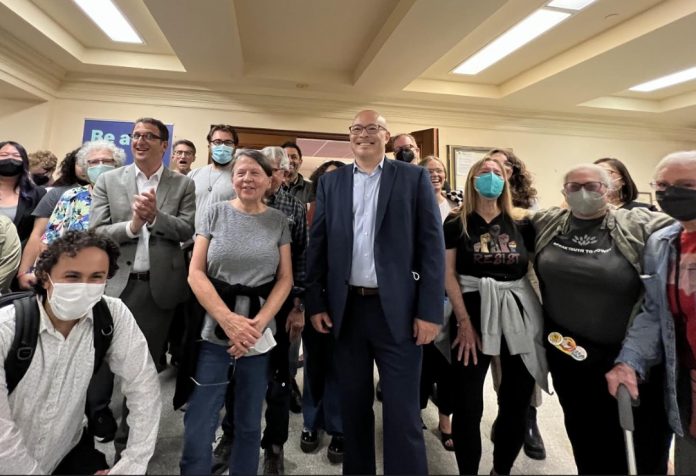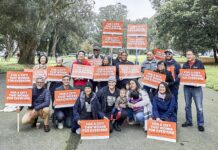Below are our full endorsements. For our handy voting guide to take to the polls, click here.
A professional political consultant, someone who has worked on progressive campaigns for years, told us recently that candidates for local office need to move to the right on housing. “The Yimby narrative has won,” he said.
That’s a serious indictment of the local news media—and, frankly, of some political leaders who refuse to stand up to a developer-driven fantasy, that the free market and “streamlining” will somehow make housing affordable in San Francisco.
It’s the same sort of media-driven lie that led to the recall of District Attorney Chesa Boudin—that putting more people in jail will make the city safer.
We’ve spent more than 50 years refusing to accept the downtown-developer-big tech-tough-on-crime approach to San Francisco, and our record is pretty clear. Most of what they have offered has failed.
So here we are again, with an election hanging on housing, homelessness, and criminal justice, with right-wing candidates saying that the free market and the War on Drugs will make the city a better place. That’s never happened, and it never will.
We are endorsing candidates and ballot measures that come from what we like to call the reality-based political world. From what works.
It’s crucial that the progressives keep their hold on the Board of Supes. It’s crucial that the mayor and the developers and the big-money don’t get tech folks don’t get full control of the city. We’ve seen that show before. It didn’t end well.
Our endorsements follow.
State Races
All the Democrats are going to get elected. That’s how California works right now, and it’s better than the days when Republicans (like Pete Wilson and Arnold Schwarzenegger) won the race for governor. Sure, let’s keep it a Democratic state.
But while we are not opposing any of the Dems, we aren’t exactly thrilled with some of the people on the ticket, starting with Gov. Gavin Newsom.
Let’s be serious: Newsom was never a progressive, was never terribly reliable on important issues—and is now clearly running not to be the governor of a blue state but to be president of the United States.
That’s why, for example, he just vetoed legislation that he had previously supported that would have allowed safe-injection sites in San Francisco, rejecting the scientific evidence because he’s afraid a Republican might attack him for it.
Newsom is happy to demand that cities allow developers to build more housing—but he has allocated nowhere near the money that local government needs to meet even his own administration’s mandates for affordable units.
He campaigned as a supporter of single-payer health care, but instantly abandoned that position when he won.
Newsom, like all of the Democrats (some of whom are at best unqualified for the jobs they seek) are going to win. There are no Republicans even remotely worthy of your vote.
We are happy to endorse Attorney General Rob Bonta and Secretary of State Shirley Weber. On the rest, vote your conscience. Or don’t.
US Senate
Alex Padilla
Padilla, appointed by Newsom to fill the seat of Vice President Kamala Harris, has been a competent representative for the state. He’s a big supporter of immigration reform. He’s on the ballot twice, once to fill the remainder of Harris’ term and once for his own term.
Congress
No endorsement
The real question here is what happens if the Democrats don’t retain the house, and Speaker Nancy Pelosi decides she doesn’t want to be the minority leader (and, quite possibly, the Democrats in Congress decide it’s time for someone new).
Pelosi has been a consistent disappointment, from the moment she decided that she cared more about a leadership role than about her district. She oversaw the privatization of the Presidio. She has done little or nothing to promote federal money for affordable housing. She has consistently dismissed progressives like AOC and the Green New Deal. She’s all about raising corporate money for the party, making Democrats the Party of Goldman Sachs.
But after four decades, one of the most attractive House seats in the country is soon going to open up soon. She can win another term, and if she does, she needs to serve it, and not resign in the middle, triggering a low-turnout special election, like the one that put her in office, that will favor a big-money candidate.
State Assembly, District 17
David Campos
Matt Haney is the incumbent. He won by abandoning his progressive record, siding with the Yimbys, and taking big money from a radically anti-labor group.
Campos, who lost the primary, is still on the ballot. He can’t win, and he isn’t campaigning, but you can vote for him and send a message that you are sick of Haney’s me-first style of politics.
State Assembly, District 19
Phil Ting
We don’t always agree with Ting, particularly on housing issues, where he’s been solidly in the Yimby camp. But he has shown considerable courage in his local endorsements, supporting Campos over Haney and opposing the recall of Chesa Boudin. He backs Gordon Mar in D4. So he’s aligned with the progressives on a lot of local races; he just needs to understand that the interests of State Sen. Scott Wiener and the real-estate industry are diametrically opposed to the interests of the local progressive movement.
Judges of the Supreme and Appeals Courts
Yes on all
It’s an old and somewhat odd part of the California Constitution: Every Supreme Court and Appeals Court judge has to face the voters every 12 years, or right after being appointed—not in an election with an opponent, but in what amounts to a recall: Vote yes to keep them in office, vote not to toss them out.
We have always taken the position that judges who are not grossly incompetent should keep their jobs, that this isn’t and shouldn’t be a partisan issue. In one of the great electoral disasters in California history, voters driven by a campaign of lies rejected Chief Justice Rose Bird in 1986 because her foes said she wasn’t doing enough to allow executions (it was really about big business not liking her pro-union rulings).
On the other hand, there’s a value to this election process: If the nation’s voters could reject Trump’s appointees to the Supreme Court, the United States might be a much better place.
In this case, all of the justices are qualified and competent. Vote yes.
San Francisco Races
Board of Education
Alida Fisher
Gabriela Lopez
Lisa Weissman-Ward
The recall of three School Board members, which was supposedly about COVID but was really about racist admissions policies at Lowell, was a disaster that put the mayor in charge of the schools.
We recognize that SFUSD has serious problems, most of them related to funding. We share the frustration of parents who scrambled during the pandemic because the aging facilities (lacking ventilation) at local schools made re-opening more difficult. We agree that during the pandemic, renaming schools (which we fully support) shouldn’t have been a priority. It could have waited a year.
But the bigger problem is that the district has a radical teacher shortage, brought on by a lack of money to pay decent wages, that the racial achievement gap is alarming, and that the mayor’s appointees seem to think that it’s fine to just show up, have short board meetings, ignore public input, and let the superintendent run the show.
We are endorsing two challengers, Fisher and former board member Lopez, and the one incumbent who has the backing of the teacher’s union.
Community College Board
Susan Solomon
Anita Martinez
Vick Chung
We have supported the three incumbents in the past. Thea Selby and John Rizzo also both ran for supervisor, and we endorsed them. Brigitte Davila seemed qualified for the job.
But City College right now badly needs new leadership.
The incumbents signed off on a plan to lay off dozens of faculty members, including tenured faculty, in the name of a terrible fiscal standard and policy set by the state, which wants to decimate community colleges and turn them all into schools aimed only at educating students who can transfer to four-year programs.
This is a crisis that threatens the basic foundations of one of the most important institutions in San Francisco. And the incumbents have gone along when they should have been using everything at their disposal to fight back.
We are supporting Prop. O, because in the end, the people of San Francisco have to pay to keep City College alive when the state is attacking us. But we need strong, outspoken, even radical leaders who will refuse to accept a diminished role for the school.
We thank Rizzo, Selby, and Davila for their service, and we endorse the challengers who are offering a real alternative.
Assessor Recorder
Joaquin Torres
Torres comes from a powerful political family: His father, Art Torres, was a state Legislator and a chair of the state Democratic Party. His background is political, not professional; he’s never been a real-estate appraiser. But that’s fine, this is a political office.
We have two concerns with Torres.
He has overseen a profound shift in the online access system to some of the most important public records in the city, and it’s been a total disaster. Members of the public used to be able to access, easily and free, city property records. Now, those records are mangled, inaccessible, and hidden behind a paywall, because that’s what a private vendor wants.
This is utterly unacceptable. Assessor-Recorders offices all over the country have managed to create simple public databases. Not here in the capital of the tech world. This needs to be a top priority, and we see little evidence that Torres cares.
Over the next year, hundreds of big property owners are going to ask the city to dramatically lower their taxes. It will be up to Torres to fight as many of these assessment appeals as he can, as vigorously as possible. At stake are tens of millions of dollars in city funds.
There’s no choice here; Torres is running unopposed. But we will be watching.
District Attorney
John Hamasaki
This race should never be happening. The term of the elected district attorney in San Francisco runs until 2023. The office is on the ballot now because allies of Mayor Breed raised and spent millions to recall the duly elected Chesa Boudin ahead of the end of his term, and the mayor replaced him with her own candidate: Brooke Jenkins—who just happened to be one of the leaders of the recall effort.
Jenkins has already proven to be a disaster who is trying to restart the War on Drugs, which has never worked anywhere in the world. She has effectively ended Boudin’s program of prosecuting cops for misconduct. She is moving the city backwards on criminal-justice reform.
John Hamasaki is a criminal defense lawyer and former Police Commission member who was among the best commissioners in modern history at questioning and holding the chief and his department accountable.
Jenkins is the mayor’s DA, and does what the mayor wants. Hamasaki is independent. He would set the city back on track.
Also in the race: Joe Alioto Veronese, scion of an SF political dynasty and a civil-rights lawyer. Alioto Veronese has little if any experience in criminal law, and is running, if anything, to the right of Jenkins.
We’re with Hamasaki.
Public Defender
Mano Raju
Rebecca Young, who was an excellent public defender, is challenging her former boss, arguing that he puts too much money and effort into policy work that is outside the courtroom. She has gotten little political traction, and there’s no evidence that Raju’s efforts (which we could argue are absolutely necessary, given how little pro-defendant policy work is being done) have hampered the effectiveness of his legal team.
He deserves re-election.
Board of Supervisors, District 2
No endorsement
Catherine Stefani has been the most conservative member of the board, a big supporter of the mayor and the cops who has shown little in the way of independent leadership and nothing in the way of a credible legislative record. She will be re-elected, without our support.
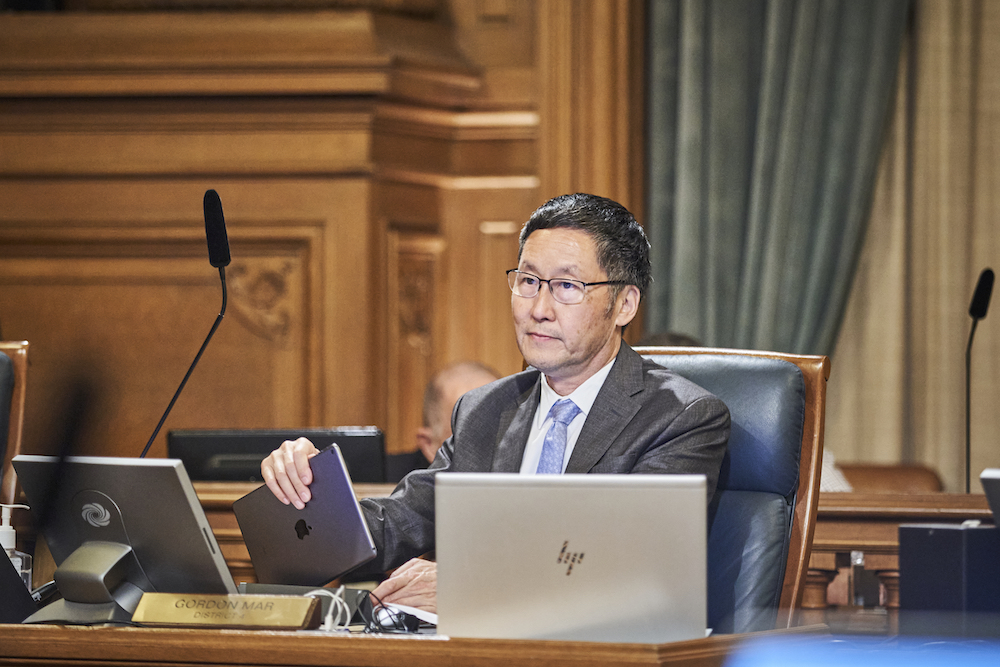
Board of Supervisors District 4
Gordon Mar
Mar is a progressive in what is now, thanks to the gerrymandering of the redistricting process, a much more conservative district. His campaign and his positions reflect that, to some extent: In a recent debate, he insisted that he supports merit-based admissions at Lowell High School, a flashpoint for the right-wingers who orchestrated the recall of three School Board members.
But Mar remains a key part of the progressive majority on the board, and it’s important that he win re-election. He has been a strong advocate for affordable housing in the district, is always strong on labor issues, and has challenged in public hearings the Yimby position that more upzoning and more private development will bring down housing prices.
This will be a tight race: Joel Engardio, who ran two years ago in District 7, is now in D4, and is running on the conservative, pro-developer, pro-police line. He was part of the effort to recall the School Board members and the DA.
We will give Engardio this: A former journalist, he is always accessible and doesn’t duck questions.
But the choice in this district is clear. Vote for Gordon Mar.
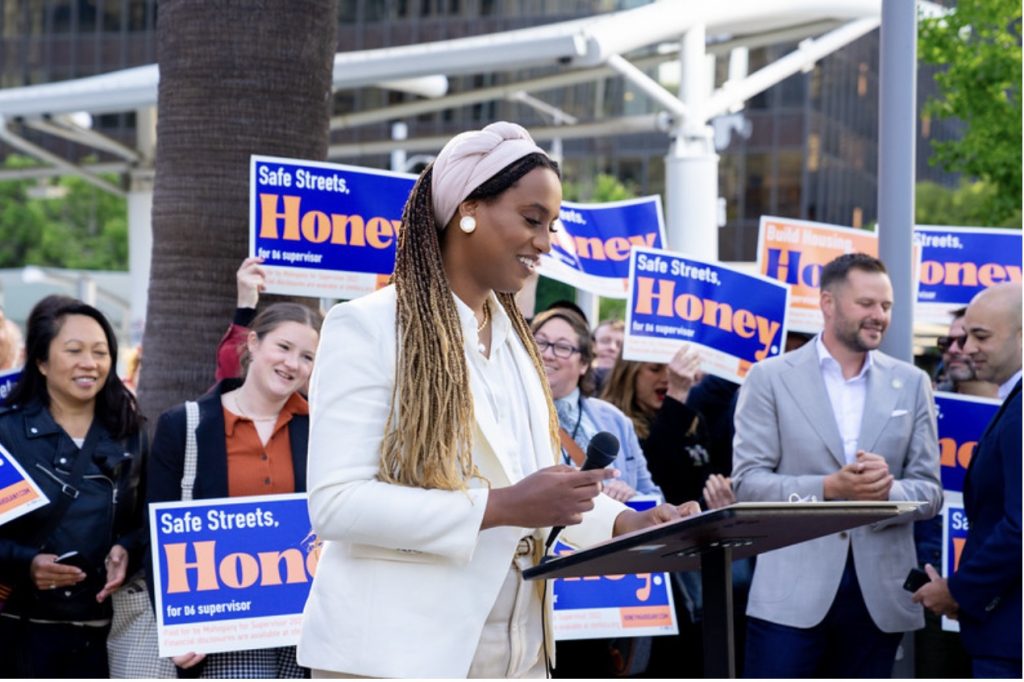
Board of Supervisors, District 6
Honey Mahogany
It’s entirely possible that a former Police Department public-relations person who supports the mayor’s criminal-justice policies and proudly calls himself a Yimby will be elected to a full term from what has always been a progressive seat.
Since the return of district elections, we have seen Chris Daly, Jane Kim, and Matt Haney representing what used to be a SoMa and Tenderloin district. Now, thanks to Haney’s gross, toxic ambition, the balance of power on the board could change in the mayor’s favor.
Haney decided not to finish his term, and instead run for state Assembly, shifting his political positions dramatically to the right and alienating a lot of his former allies. His victory gave the mayor an appointment, and she named Matt Dorsey, who is running for a full term this fall.
Dorsey’s background is in public relations, and for years he was the press secretary for former City Attorney Dennis Herrera, a role he fulfilled well. Then he moved to doing communications (some would call it “copaganda”) for SFPD. He is running on a platform of cracking down on drug sales and arresting drug dealers as a way to cut down on the appalling level of overdose deaths in the city. He’s also in favor more market-rate housing development, which the evidence shows never will bring down prices to the level that much of the San Francisco workforce can afford.
To his credit, he has said that he opposes the regressive toll on Treasure Island, although he hedges that by saying he’s open to a “congestion fee,” which is a toll.
Honey Mahogany is a social worker by training and Haney’s former chief of staff. She is experienced at City Hall and completely qualified for the job.
It’s not her fault that her former boss sold out his principles and legacy for higher office, but she still has the burden of running as his candidate. (Haney said when he decided to give up his seat that he thought the mayor would appoint Mahogany, which was just another delusion.)
The problem with Mahogany is not that she once worked for Haney; it’s that she’s taken much of the Yimby stance on housing. In debates, she’s talked about how much housing was built in SoMa while she was a staffer (um, other than the mandate affordable units, has all of that new housing brought prices down to a reasonable level? No). She supports the toll on TI, which Haney pushed. She opposes Prop. B, which would under a Haney change in the management of the Department of Public Works, and which most progressives support.
Like Mar, Mahogany is facing a gerrymandered district that is more conservative than it used to be. But her campaign seems to have bought into the idea that the Yimbys have won the housing debate, and the only way to get elected is to go along. This concept is disturbing, and a more than a little scary.
But Mahogany is a small business owner, who cares about the future of entertainment and nightlife, would be the first transgender person elected to the board, and is and will remain independent of the mayor. (Haney and his allies are still furious that Breed appointed Dorsey.)
The progressives need policy allies, but they also need people who aren’t part of Breed’s operation and who can freely stand up to the mayor. We are going with Honey Mahogany.
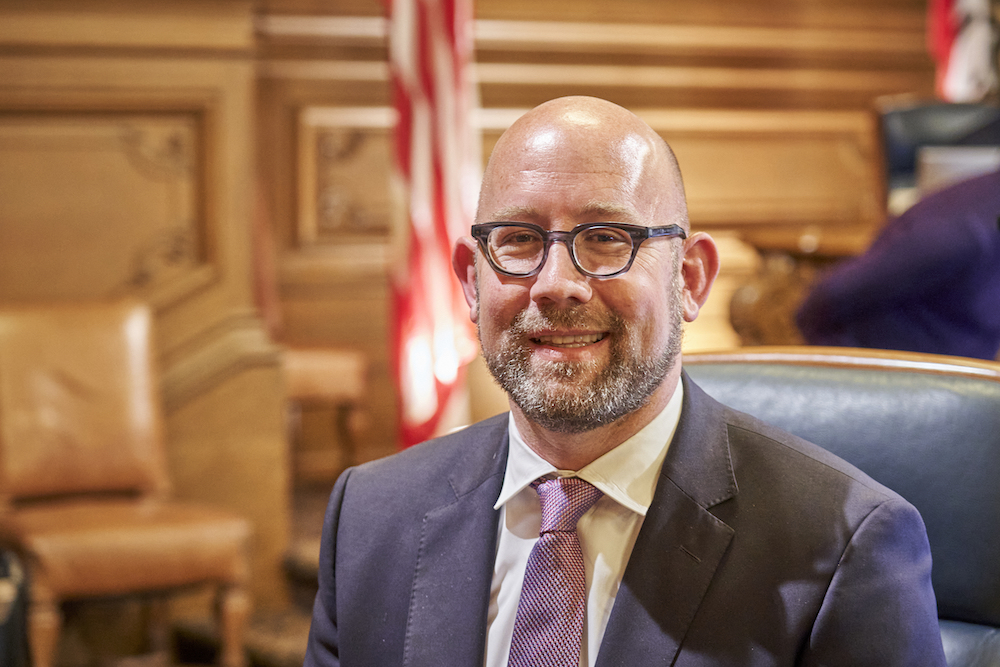
Board of Supervisors, District 8
Rafael Mandelman
At his campaign kickoff rally in Noe Valley, Mandelman talked about the debates in the city, from the left and from the right, on a wide range of policy issues. Then he said: “I am right in the middle.”
That could be a campaign slogan, he said: Mandelman, right in the middle.
Mandelman’s record is not what we were (perhaps naively) hoping for when we strongly endorsed him four years ago. He’s pushing for a measure that would require homeless people to accept city shelter (which he wants to greatly expand) or face citations. Shelter is not housing.
He’s pushed to upzone the entire city to create more housing, although he admits it won’t really do that much and certainly won’t bring prices down.
Still, he’s accessible, reasonable, listens to opposing points of view, and seriously cares about public policy. He’s not a wild Yimby ideologue like Scott Wiener. If we are going to have a moderate in D8, which has been the history of that district, we could do a lot worse than Rafael Mandelman.
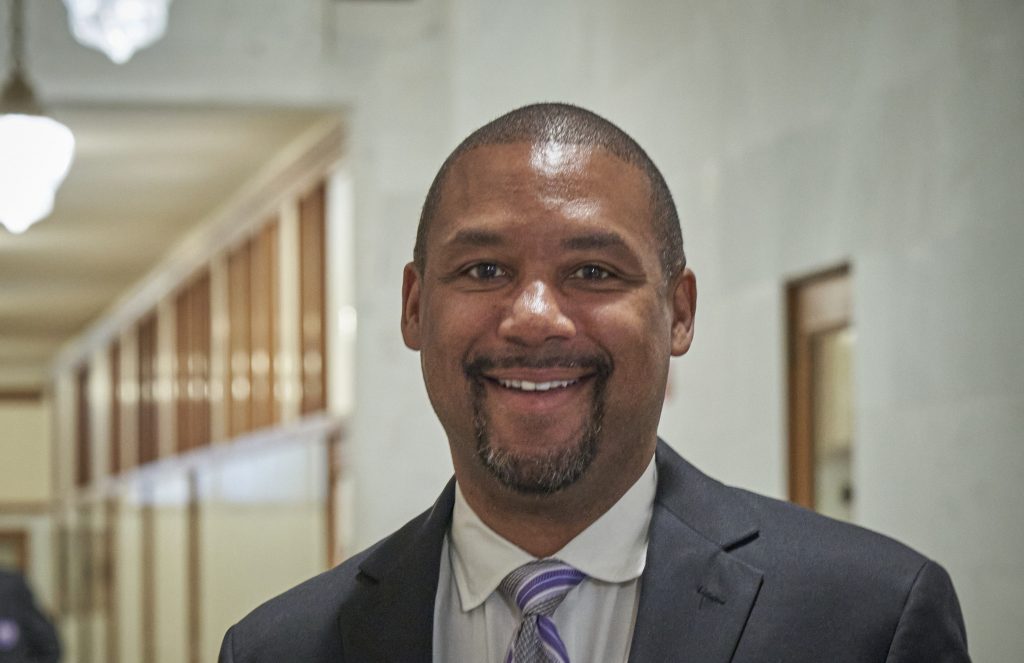
Board of Supervisors, District 10
Shamann Walton
Walton has been an exceptional supervisor, a great board president and a powerful representative for one of the most marginalized districts in the city. He is fearless in speaking his mind and working for the people of D10. He can’t be pushed around by the mayor or anyone else. He’s been on the right side of almost every issue, and taken the lead on many progressive causes. We could not be more happy to endorse him for another term.
State ballot measures
Proposition 1
Reproductive freedom
YES, YES, YES
With the right to reproductive choice under attack all over the country, and the lives of women literally in the balance, Prop. 1 would enshrine the right to an abortion in the California Constitution. It’s going to pass, but that’s not enough: It needs to pass overwhelmingly, with a massive majority, to send a message to the rest of the country. Vote yes.
Proposition 26
Proposition 27
NO
We have no problem with gambling in California. We have always supported the sovereign right of Native American tribes to operate casinos on their land, and we think they should have the right to add dice games and sports betting to their venues.
We don’t care if adults want to use their phones to make bets on sports, and we think the state should legalize the practice and tax it heavily.
But these two competing initiatives are an example of how the state Legislature has failed to deal with complex issues, leaving it to the voters to choose between flawed measures funded by deep-pocket private interests who are going to spend more than $300 million to try to win a share of a multi-billion-dollar market.
Neither of these measures makes sense—and the idea that Prop. 27 would generate money to fight homelessness is largely bogus. Most of the money that sports gambling would generate under either measure would go to private companies.
This isn’t a simple issue: If out-of-state gambling companies that are backing Prop. 27 win, it will hurt the existing tribal casinos which are a lifeblood for people whose ancestors have been murdered, had their land stolen, and only recently have been able to use gambling to make money to send their kids to college and provide jobs and healthcare.
If Prop. 26 wins, sports gambling outside of casinos (and weirdly, horse racing tracks) will continue unregulated and untaxed (seriously, anyone who wants to do this can do it right now, and the state gets nothing).
There’s a way to fix this, a compromise that would give the tribes the right to offer any gambling they want and would give the state control over online sportsbook. That’s what we elect state legislators to do.
They have failed. This is the wrong way to make policy. We’re voting no on both.
Proposition 28
Funding for arts and music in public schools
YES
We will be honest: This is a set-aside. It’s one of those inflexible budget items that often become a problem when the state faces a recession, which is likely in the next year or two. It’s also a statement that art and music are as important as math and science and English in public schools, and shouldn’t be the first things cut when times are tight.
We can support that.
Proposition 29
Dialysis medical staff
NO
This is the latest attempt by SEIU-UHW to negotiate a union contract for the two companies that dominate the critical dialysis clinic business by putting new regulations on the ballot. The idea: If the union forces the companies to spend hundreds of millions fighting these measures, maybe they’ll come to the bargaining table.
We’re with the union; these clinics ought to be organized. But this strategy is a loser (previous measures have been rejected twice) and this kind of expensive battleground will only be a loser (a very pricey loser) for the workers. This is not the way to set regulations for the industry. Sorry, we have to say no.
Proposition 30
Taxes for wildfire prevention
YES
It’s easy to criticize Prop. 30. The biggest issue is that it’s funded mostly by Lyft, because that company, which has been a bad player in an illegal industry that decimated the taxi business and destroyed drivers lives, doesn’t want to pay for new electric vehicles.
Prop. 30 would increase taxes on incomes of more than $2 million to support firefighting efforts (that’s always a popular concept) and to provide subsidies for the purchase of electric cars.
Gov. Gavin Newsom has been featured in TV ads attacking the measure as a special-interest giveaway to Lyft. That’s such a hypocritical joke: Newsom as mayor of SF, lieutenant governor, and governor has never once moved to more tightly regulate the TNC industry (Uber and Lyft).
So yeah, this isn’t perfect. It will help Lyft because the company won’t have to pay as much to meet future mandates for an all-electric fleet. We get that.
But we also get what the great modern economist Thomas Piketty says: Taxing the rich today is a good idea, by definition, no matter what you do with the money. Taking income and wealth from the top 1 percent always makes society more equitable.
Vote yes on 30.
Proposition 31
Tobacco products referendum
YES
The United States has made tremendous progress in stopping young people from using tobacco. High School kids don’t smoke cigarettes at anywhere near the levels they did a generation ago. So the tobacco industry, which needs to constantly find new customers since existing customers die from the use of their products, has shifted to flavored products aimed entirely at the youth market. In 2020, the state banned some flavored tobacco products, but that ban didn’t go into effect because this referendum qualified for the ballot. “Yes” means you want to continue banning flavored tobacco.
Local propositions
Proposition A
Pension adjustments
YES
Prop. A fixes a loophole that prevents some city employees who retired before 1996 from getting an annual Cost of Living Adjustment in their pensions. All 11 supes supported putting it on the ballot, and it has no visible opposition.
Proposition B
Street cleaning and public works
YES
Prop. B would undo a 2020 measure by former Sup. Matt Haney that created a new department to oversee street cleaning. It hasn’t done much to keep the streets cleaner, and it costs as much as $10 million extra a year. This measure would put street cleaning back under the Department of Public Works. The major opponent is the Laborer’s Union, which has been a big ally and supporter of Haney. Vote yes.
Proposition C
Homeless commission
YES
Almost everyone who lives or works in San Francisco agrees that homelessness is one of the city’s most pressing issues. The Department of Homelessness and Supportive Housing has a budget of some $672 million a year. But there’s no direct public oversight.
Prop. C would create a Homelessness Commission to oversee the department. It would hold public hearings, approve the department’s budget—and give the community a place to go to demand accountability.
It’s a compromise measure; the mayor would appoint four of the seven commissioners, leaving the chief executive (who we could credibly argue has done nowhere near enough to address homeliness) in control. But the Coalition on Homelessness supports it. So do we.
Proposition D
NO, NO, NO
Prop. D is a Yimby and developer scam. It purports to streamline the process for building affordable housing—but only by redefining market-rate housing as “affordable.” The prices that would meet the standard for a project that can be built without community input are, in fact, the same prices that landlords are getting for housing in much of San Francisco today. A building containing one-bedroom apartments that rents for $4,000 a month would qualify for special treatment.
That’s not affordable to much of the local workforce—but by using that definition, developers can get special benefits without sacrificing their speculative profits.
The campaign for Prop. D is funded largely by three rich tech bros.
The Building Trades Council, the teacher’s union, the Tenants Union, the Anti-Displacement Coalition, and the Council of Community Housing Organizations (made up of nonprofits that actually build affordable housing) oppose D. Vote no.
Proposition E
YES, YES, YES
Prop. E is the alternative to Prop. D, put on the ballot by the Board of Supes. It would streamline real affordable housing and housing for teachers at SFUSD or City College. It also requires large private developers who get streamlined approvals (that is, approval within six months) to use a skilled and trained workforce that includes people who graduated from union apprenticeship programs. The same groups that oppose Prop. D support Prop. E.
Some of the arguments about Prop. E are not just specious but wrong: SPUR, for example, says this would allow “the same systems that enabled the Board of Supervisors to block the construction of 495 new homes on a valet parking lot at 469 Stevenson.” That project wouldn’t have qualified for streamlining under either Prop. D or Prop. E; it was a luxury housing complex.
Vote yes on E.
Proposition F
Library Preservation Fund
Yes
Prop. F just renews an existing small tax set-aside for the public library system that has been in place since 1994. Vote Yes.
Proposition G
Student success fund
Yes
This one is both simple and a bit complicated. The simple side is the outcome: San Francisco would be able, under Prop. G, to direct between $11 million and $60 million a year to a special fund for certain public school programs, including tutoring, math and language proficiency, arts and science programs, social workers and counseling, as well as summer programs. Schools could apply for grants of up to $1 million.
The financing is the complicated part: Much of the money would come from something called ERAF. Here’s how it works: The state takes some local property tax money for school funding, and gives it back to community colleges and public schools at a set rate. If San Francisco contributes more than it needs, that Education Revenue Augmentation Fund money comes back to the General Fund. It typically runs about $300 million a year.
So in essence, Prop. G sends some money that was earmarked for schools back to the schools. It makes sense. Vote Yes.
Proposition H
Election year changes
YES
Sup. Dean Preston proposed this idea, and most of his colleagues agreed to put it on the ballot. It would move the races for mayor, district attorney, city attorney, sheriff and treasurer to even-numbered years when a presidential race is also on the ballot. The idea: Presidential elections drive much higher turnout, so more San Franciscans would be involved in choosing the city leaders.
Opponents of the measure, like Mayor Breed and Republican Richie Greenberg, argue that it’s an effort by Preston to elect more left-wing (or gasp, “Democratic Socialist”) candidates.
We’re not convinced that the left will necessarily benefit from the move: Progressive candidates and causes don’t always do better in high-turnout elections.
But that’s not the point: Higher turnout is by definition a good thing. We’re going Yes on H.
Proposition I
Cars on JFK Drive and Great Highway
NO
Proposition J
Car ban in Golden Gate Park
YES
It’s a testament to the absence of credible leadership out of the Mayor’s Office and some of the supervisors that these dueling measures are on the ballot.
During the height of the pandemic, when gyms and pools and rec centers were closed and the city was desperate for outdoor recreation space, Mayor Breed closed the Great Highway and JFK Drive in Golden Gate Park to cars (along with creating slow streets areas all over the city). It made perfect sense: Lots of people were limiting their travel, so why not let people walk and bike and skate on the streets?
But as the pandemic began to wane and people started going back to work and shopping and car traffic picked up, city officials decided to make the closures permanent. Again, in the long term, that makes a lot of sense: The Great Highway is going to have to close south of Sloat (and maybe in other areas) anyway because of sea-level rise and coastal erosion. Closing JFK Drive to cars has been a dream of many park users (and the Bay Guardian) for decades.
But Breed closed off car traffic pretty much by fiat, without restoring, much less expanding, Muni service in the impacted areas. That meant cars that used to go along the Great Highway (thousands of them) just moved into the westside neighborhoods, creating a traffic and environmental mess. (Stop and go traffic creates more carbon emissions than traffic that moves quickly.) The mayor offered no plan whatsoever to deal with the problems. The MTA and Rec-Park just made the decisions on their own, behind closed doors, with little public input.
Sup. Shamann Walton noted that people in the Southeast part of town can’t get to Golden Gate Park on the bus; it takes hours.
There’s a clear race and class issue here: The majority of the people using car-free JFK Drive are white, many of them young and able-bodied. Many of the people who use car-free Great Highway are white, and a lot of them drive there, park in the parking lot, and then take their bikes for a ride. Not everyone who drives a car is rich.
This could have been a public process where all of the serious issues involving transportation equity in San Francisco could have been hashed out and addressed. The end result might have been the same—but it wouldn’t have left so many people angry and frustrated. It might not have driven those people to put this whole thing on the ballot (and then the supes to put a competing measure on the ballot).
Frankly, Prop. I (which is funded by Republican Dede Wilsey and the museums, which want the parking for their customers) doesn’t make a lot of sense. Prop. J shouldn’t be on the ballot. This is not the way to make public policy on a really complex issue.
But that’s what Mayor Breed and her MTA and Rec-Park folks brought us. We’re opposing I and (very reluctantly) supporting J. A mayor who knew how to bring people together might have prevented this. The whole fiasco is just another sign that it’s time for a serious candidate to start working to challenge Breed.
Proposition K was removed from the ballot.
Proposition L
Sales tax for Muni
YES
In the general pantheon of taxation, sales taxes are among the worst; they’re regressive (although in San Francisco, about half the money comes from business-to-business sales). But this half-cent sales tax has been in place since 2003, and it’s critical to funding Muni’s future.
The city is going to have to make major investments in public transit, and some major changes, in the next few years. The tax will allow the MTA to issue $1.1 billion in bonds to pay not just for Muni but a new Caltrain station in Bayview and an underground extension to the new transit center. It’s an easy call. Vote Yes.
Proposition M
Vacant apartments tax
YES, YES, YES
This measure, sponsored by Preston, would impose a fairly significant tax on apartments that are kept vacant, for no good reason, for more than a short period of time. It has two goals: encourage landlords to rent out of some the 40,000 or more empty units at a time when the city has a housing crisis (and putting existing units on the market is way faster than building new housing) and raise money from the scofflaws for an affordable housing fund.
Vote yes.
Proposition N
Golden Gate Park garage
YES
One of the reasons so many low-income people and people with disabilities have trouble driving to Golden Gate Park is that the garage in the park is so expensive. Designed to serve wealthy patrons of the DeYoung Museum, the garage charges as much as $30 a day. And right now, under the measure that allowed the garage to be built (which we opposed), there’s nothing the mayor and the supes can do about it; the garage fees are set by an unaccountable Concourse Authority.
Prop. N would dissolve the Authority and give control of the garage to the city, so the city can set rates and if necessary subsidize parking. Vote yes.
Proposition O
City College parcel tax
YES
City College is a crucial public institution in a state of perpetual crisis brought on by very bad state policies. The state doesn’t want to fund institutions that offer lifelong learning; it wants community colleges to have no purpose beyond offering two-year degrees that lead students to transfer to four-year colleges.
That’s important, but it’s not the only role City College plays. The institution provides English as a Second Language classes for immigrants who want to get better jobs and become US citizens. It offers classes for seniors who want to keep active. It’s where culinary and health-care workers get training. These are essential services—and it’s been clear for some time that the only way they can continue is if the local taxpayers fund them.
Prop. O is a parcel tax on property owners—better than a sales tax, worse than an income tax (which cities in California can’t easily impose). It would raise about $37 million a year, enough to keep the school out of its current fiscal disaster.
We are endorsing Prop. O, happily and strongly, while we also call for new leadership on the college board.

